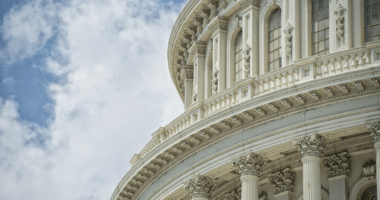A Platform That Reflects Evolving Trends in Education
NAESP runs on resolutions that focus on leading, learning, and community—and we’re counting on your feedback to ensure they continue to represent the issues affecting schools and their leaders.

What does NAESP stand for? What do its members believe? The answer is the NAESP Platform, a set of 42 resolutions that focus on leading, learning, and community, which guides the association in everything we do. The platform is developed, overseen, and annually updated by our members to ensure they continue to represent the issues you’re seeing in your schools and communities and in school leadership.
“The resolutions process to update the NAESP Platform provides school leaders a seat at the policymaking table and a voice in thought leadership on the issues that impact the schools and the profession,” said Liza Caraballo-Suarez, who as NAESP president-elect serves as chair of the Resolutions Committee. “By annually reviewing and defining what we as principals believe about the promise of public education, we ensure that we keep our focus squarely on pursuing an equitable learning experience for the students we serve.”
Every year, a Resolutions Committee comprised of your membership peers reviews all of the resolutions to ensure they are still relevant and on-point in today’s education landscape and to suggest updates, if needed, to better reflect the changes that are happening in our schools. This year, the committee proposed revisions to the introduction and 23 resolutions. The process is then opened to the NAESP membership for their review. This is where you come in.
What’s Up for Review
Education was changing long before the pandemic hit—but it has accelerated since then. NAESP’s Leaders We Need Now research outlined policy priorities principals believe are necessary to address new realities of school leadership, help schools reset and refocus, and support students and staff. These themes carried over into the proposed edits to many of the resolutions in the NAESP Platform that are responding to emerging issues.
- Principal Preparation: It isn’t just for new leaders or those transitioning to a new school anymore. The committee proposed changing the resolution on principal prep to promote how important it is for all principals, regardless of years of experience, to receive ongoing mentoring and professional learning.
- School Climate and Culture: Extending beyond the walls of the classroom, the concept of a positive school climate and culture more than ever encompasses school communities. One proposed update to this resolution includes ensuring schools focus on restoring the relationship with the school community after entering an era of polarization in education.
- Discriminatory Practices: Inclusive schools is a goal nationwide, and as such, the committee proposed updating this resolution to include “gender identity” as a relevant addition to the list of areas in which schools should be working toward a culture that values diversity and counters discrimination.
- School Construction and Renovation: Coming off the heels of the pandemic, proper ventilation has been an emerging issue to keep schools and students safe and healthy. This exposed a bigger issue that had been plaguing schools since before the pandemic: Schools are not equipped to handle new issues in old buildings, something the federal COVID relief funding has enable some schools to tackle through remodeling and modernization of school buildings. The proposed update to this resolution includes ventilation as part of providing an “appropriate and functional space … to support instruction.”
- Elementary and Secondary Education Act (ESEA): The committee proposed refinements to this resolution to recognize that the ESEA is the primary means of providing federal support to K-12 schools and that principal leadership is essential to implementing federal programs for the benefit of students. More broadly, federal policies should support professional development for school leaders and staff, accountability systems that include multiple measures of student success and support a well-rounded education, and fully funded formula grant programs.
- Students With Disabilities: NAESP supports a free appropriate public education for all students in the least restrictive environment possible. The committee proposed an addition to this resolution to highlight the need for “ongoing professional development in understanding and addressing bias, multilingual learners, and culturally responsive practices to mitigate possible overidentification of traditionally underrepresented or marginalized groups/students.”
- Drug and Substance Abuse: A big issue affecting schools—especially middle schools—is vaping and increased drug use. The committee proposed additions to reflect this trend and include marijuana and edibles to its list of elements that schools should educate students on in the effort to prevent the use and abuse of harmful substances.
Resolutions Review Process—And How to Take Part
Your feedback is critical to the resolutions process. Here’s how it works—and how you can take action to make sure your voice and your school are represented.
- Member Feedback Requested: Review the resolutions, including the proposed changes, and offer comments and suggestions based on your experiences as a school leader. Submit feedback via email to Jennifer Shannon, director of NAESP’s Governance Services, at jshannon@naesp.org by Jan. 9, 2023.
- Member Feedback Reviewed: The Resolutions Committee will review all member feedback by Jan. 13, 2023, to determine if further revisions are necessary.
- Open Hearing to Discuss Proposed Changes: The committee will hold an open hearing on Zoom, and all NAESP members are welcome to take part in the discussion of the proposed changes to resolutions. To take part, join the Zoom meeting 18, 2023, at 4 p.m. ET, using meeting ID 883 6052 7973 and passcode 234021.
- Open Hearing to Learn About the Committee’s Decisions: NAESP members may join an open hearing on Zoom to learn about the Resolution Committee’s decisions on the proposed changes that were presented during the first open hearing. To participate, join the Zoom meeting Jan. 25, 2023, at 4 p.m. ET, using meeting ID 824 1480 0875 and passcode 685985.
- Updated NAESP Platform Approved: During the 2023 National School Leaders Advocacy Conference, from March 26-29, 2023, the NAESP Board of Directors will review the proposed resolutions and recommended changes and inform the General Assembly of the resolutions and the board’s actions. Following approval, the updated 2023 NAESP Platform will be posted.
You lead your schools every day with passion and purpose, and we are asking for that same leadership to ensure the association you count on continues to support you in ways that help you, your school, and your community thrive. We need all members, representing all demographics in the U.S., to review the resolutions and offer insight into whether these resolutions accurately reflect what’s happening in your school, with your students, with you as an evolving school leader, and in your community. Your voice as a school leader has never been more important than it is now.
David Griffith is associate executive director of Policy and Advocacy at NAESP.




